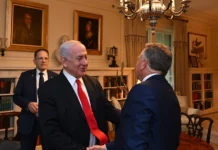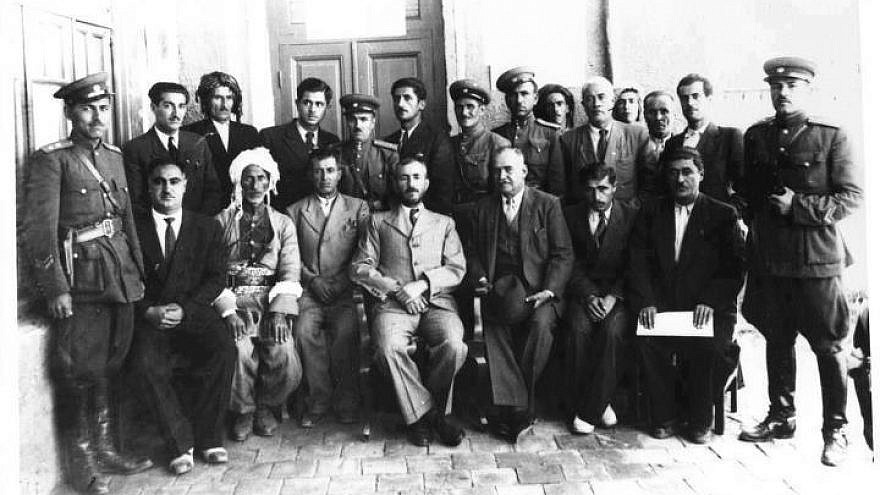Two days after announcing the betrayal of America’s Kurdish allies in Syria, U.S. President Donald Trump decided to belittle them for good measure. “Now the Kurds are fighting for their land,” Trump told reporters during a press conference on Wednesday night. “They didn’t help us in the Second World War; they didn’t help us with Normandy, for example.”
Needless to say, were a country’s affiliations during World War II to be the sole determinant of who is deserving of American support today, our alliances would look rather different. But that isn’t what Trump was thinking about. His broader point was that, in his assessment, the Kurds don’t really care about anything beyond Kurdistan and are therefore of limited use to the United States. Having reduced the relationship to a purely transactional one, Trump then underlined his point with a nonsensical dig about who was and wasn’t present during the D-Day landings of June 1944.
In doing so, Trump raised the question, “what did the Kurds do during World War II?” There were some who rightly answered that the very question was insulting, given how much the Kurds have suffered during the last century at the hands of Turkey, Syria, Iraq and Iran, along with the U.S. reliance on Kurdish ground forces, especially in Iraq, that stretches back to the 1980s.
Others went scurrying for evidence that Kurds had, in fact, participated on the Allied side during World War II, if not on D-Day itself. No one, as far as I can make out, looked into the situation of the territory inhabited by the Kurds during that period—a story that is worth revisiting for the light it shines upon this 25 million-strong nation’s current predicament.
This is where the story gets interesting. In essence, the Kurds spent World War II trying to undo the consequence of World War I—the cruel denial of their right to self-determination. In December 1945, a few months after the end of World War II, the Kurds came the closest they have yet been to fully-fledged statehood with an experiment that became known as the Mahabad Republic.
A power vacuum was seized upon by Qazi Muhammad, the charismatic Kurdish national leader, as an opportunity for the Kurds to declare independence, with their seat of government in the northwestern Iranian city of Mahabad. One of the few foreigners who visited the Mahabad Republic was Archibald Roosevelt Jr., a grandson of former U.S. President Theodore Roosevelt, who was also a CIA career officer, as well as a noted scholar of Middle Eastern history and languages.
In an essay published by the Middle East Journal in July 1947, Roosevelt provided an eyewitness account of life in a more or less independent Kurdish state. Although Qazi Muhammad was allied with the Soviets, Roosevelt noted that the Kurds were not particularly sympathetic to the USSR—“they frighten their crying children into silence by threatening them with the word ‘Russian,’ ” he wrote—and there was a degree of internal freedom among the Kurds that was unknown to their neighbors.
“In the streets of Mahabad, one could hear radio broadcasts from Ankara or London, while in [Soviet-occupied] Tabriz to listen to these brought the death penalty,” recalled Roosevelt. “Whether the reason for this freedom was the moderation and liberalism of Qazi and his cabinet, or the presence of tribes who would not tolerate violent action against persons connected with them, the net result was to make the regime popular at least among the citizens of Mahabad, who enjoyed their respite from the exactions and oppression they considered to be characteristic of the central Iranian government.”
However, this respite lasted for only a year; on Dec 15, 1946, the Iranian army entered Mahabad and proceeded to “eradicate,” as Roosevelt said, any traces of Kurdish independence. The collapse of the Republic was partly caused by the deep internal divisions among the Kurds, but the main culprits, according to Roosevelt, were the Soviets. Russian support “failed to materialize” and a nationalist movement “which might have united a majority of educated Kurds was infiltrated by foreigners who used it for their own purposes and then let it be destroyed,” he argued.
At the end of his article, Roosevelt suggested that if the states where the Kurds live would “allow their Kurdish populations a degree of local autonomy and give up the attempt to force an alien nationalism upon them, they may succeed in obtaining a loyalty to that found in Switzerland with its multinational population.” Seventy years on, that reference to the Swiss model reads like an appallingly tasteless joke.
Since 2017 alone, Iranian-backed forces have crushed the bid of the Kurds in Iraq for statehood following a referendum in which they overwhelmingly backed independence, while Turkey has launched another incursion against Kurdish positions in northern Syria—and this current attack is turning out to be the most deadly of them all. Not for the first time in their history, the Kurds are telling the rest of the world that they have “no friends but the mountains,” and Trump’s cowardly policy shift compels the rest of us to shamefacedly agree.
























